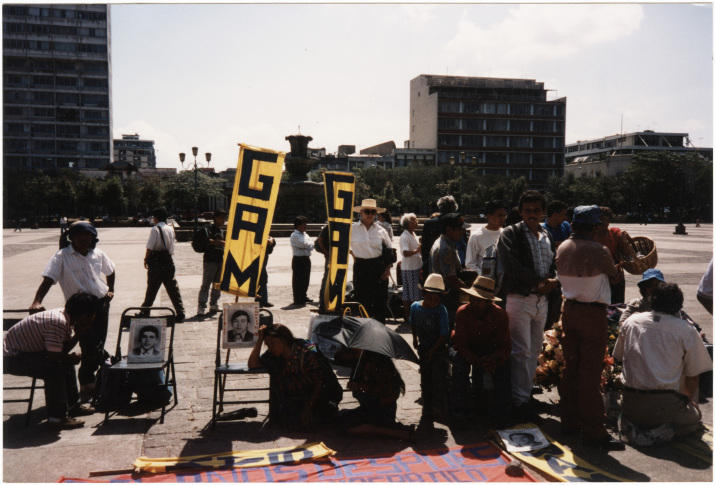-
Salvadorean Women in Athens, GA
-
Sissy in Athens with Salvadorean Women
-
Sissy in Athens, GA with Salvadorean Women
-
Photograph of Frances “Sissy” Farenthold and Jennifer Harbury at Harbury’s Hunger Strike in Guatemala City, Guatemala
-
Sissy in Athens, GA
-
Athens, GA
-
Athens, GA with Salvadorean Women
-
Salvadorean Woman Holding Peace Sign in Front of Poster
-
Salvadorean Woman Holding Picture
-
Sissy with Salvadorean Women in Athens in Chairs
Central America

Farenthold was a fierce advocate for human rights and social justice in Central America, from the early 1980s onward. As a result of the contact she had with Salvadoran refugees at her law practice in Houston, as well as policy work in which she participated through other organizations, such as the Institute for Policy Studies (IPS) and the Council on Hemispheric Affairs, Farenthold became deeply involved in the issues of El Salvador. Francisco Lopez, who came to Houston as a refugee from El Salvador in 1985, recalls that she “became like a mother for us…She became the mother of our movement there in Houston, our rock.”[1]
In 1982, Farenthold made her first visit to El Salvador as a human rights observer. The delegation was led by Wayne Smith, a former diplomat to Cuba under President Jimmy Carter. She would visit El Salvador nine more times over the course of her life to monitor and report on human rights. On one occasion in 1989, Farenthold met with the Salvadoran president to advocate for the release of detained human rights workers.
She also made several visits to other Central American countries, including Guatemala and Honduras. In the mid-1990s, Farenthold visited Guatemala with U.S. lawyer Jennifer Harbury, whose husband, Efraín Bámaca Velásquez, had been disappeared by the Guatemalan Army in 1992. Farenthold joined Harbury in advocating for U.S. acknowledgment of its involvement in the disappearance of Bámaca through CIA operatives and informants. She testified before the Inter-American Court on Human Rights regarding the case, and in December 2000, the IACHR found the Guatemalan military guilty of the disappearance, torture, and murder of Bámaca.
Invariably linking human rights issues in Central America to those in the United States—often matters specific to Texas—Farenthold wrote to Assistant Secretary of Human Rights Richard Shattuck before leaving for Guatemala in the early 1990s: “We all know that the Guatemalan military does not exist in a vacuum. Some members are being trained in San Antonio.”
Upon returning home from her visits to the region, Farenthold spoke frequently and publicly about what she had seen, and consistently called for changes in American foreign policy. Especially in the 1980s, she sought to raise public awareness about the complicity of the U.S. in unjust wars, and took lobbying trips urging officials in the U.S. and abroad to rectify human rights abuses. She consistently argued that U.S. backing of military governments in Central America was contrary to the cause of peace in the region.
As recently as spring of 2014, Farenthold traveled to El Salvador with the Salvadoran Humanitarian Aid, Research and Education Foundation (SHARE) to help monitor elections and nurture civic engagement in the region. She also attended Archbishop Óscar Romero’s beatification ceremony in May 2015. Romero, who was the Archbishop of El Salvador, was murdered on March 24, 1980, because of his opposition to violence and his courageous defense of the poor in his country.
[1] Interview with Francisco Lopez, December 10, 2013.


